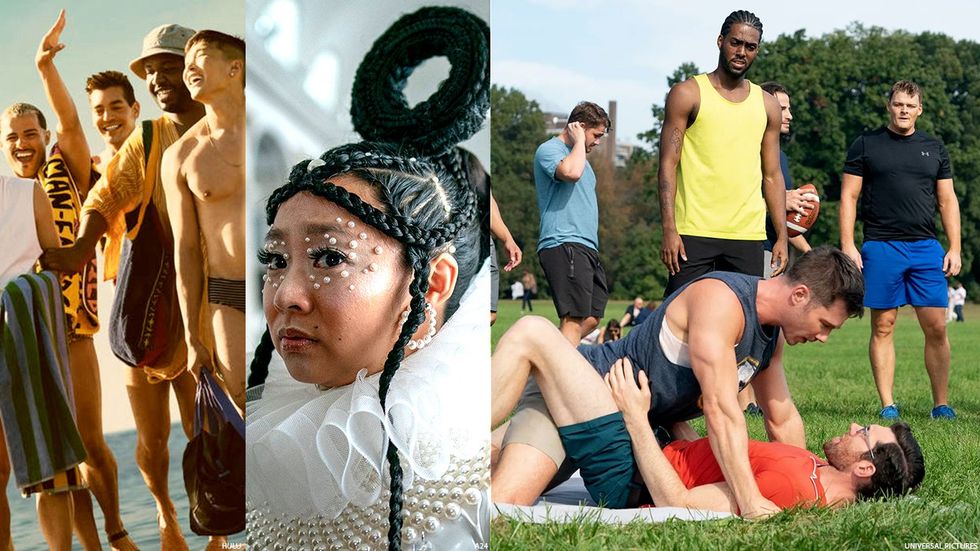LGBTQ+ representation in film improved in 2022 — but it still has far to go, according to GLAAD’s latest Studio Responsibility Index.
GLAAD released its findings Thursday morning and included a statement of support for striking actors and screenwriters.
“The outstanding LGBTQ characters and stories found in this year’s study are not possible without the work of talented writers, actors, directors, and crew on all levels,” GLAAD President and CEO Sarah Kate Ellis said in the report. “GLAAD firmly stands in solidarity with the Screen Actors Guild and the American Federation of Television and Radio Artists (SAG-AFTRA) and the Writers Guild of America (WGA) in their efforts and contributions to fair and accurate storytelling integral to the LGBTQ movement. It is crucial that the Alliance of Motion Picture and Television Producers (AMPTP) reach a fair deal with striking writers and creators — that these talented creatives can return to work as soon as possible, so that the progress made in LGBTQ representation remains on track.”
Ellis is set to appear along with representatives of SAG-AFTRA and the WGA at a press conference Thursday at the Los Angeles LGBT Center.
GLAAD’s annual Studio Responsibility Index report maps the quantity, quality, and diversity of LGBTQ+ characters in film during the previous calendar year. The report also serves as a road map for studios, identifying priorities and opportunities to increase and improve fair, accurate, and inclusive LGBTQ representation and storytelling in film.
The report for 2022 tracked a total of 350 films released by 10 distributors, both theatrically and on streaming services. Of those 350 films, 100 (28.5 percent) included an LGBTQ+ character. This is the highest number and percentage recorded in the 11 years GLAAD has conducted this study, though the number of films tracked has increased greatly from previous reports.
The first decade of the index focused on films released theatrically by major studios, but GLAAD has expanded the study’s scope to include major streaming services. The 2021 index, for instance, covered 77 films released by seven studios, and 20.8 percent had LGBTQ+ characters.
The 10 distributors tracked in the 2022 index are A24, Amazon Studios, AppleTV+, Lionsgate, NBCUniversal, Netflix, Paramount Global, Sony Pictures Entertainment, the Walt Disney Co., and Warner Bros. Discovery.
For the first time in the index’s history, three studios received a “Good” rating in the same year: A24, NBCUniversal, and Disney. This is the first time any studio has received a “Good” rating since 2019. No studio or distributor has ever received the highest rating, “Excellent.”
Seventy-seven percent of the LGBTQ-inclusive films passed GLAAD’s four-point Vito Russo Test, which is named for the late gay film critic and historian and measures the quality of representation. To pass the test, a character must be clearly a member of the LGBTQ+ community, must not be solely or predominantly defined by their sexual orientation or gender identity, must matter to the plot, and must have a story that is not outwardly offensive. In films with multiple LGBTQ+ characters, at least one character must pass the fourth point for the film to pass the test. GLAAD notes that passing this test is a first step, rather than the finish line.
Among the other findings: There were 292 LGBTQ+ characters across the 100 inclusive films. Fifty-seven percent of them had five minutes or less of screen time. Of the 292, 163 of them were men, 119 were women, and 10 were nonbinary. The proportion of LGBTQ+ characters of color remained static from 2021, at about 40 percent.
Twenty-one percent of the inclusive films had bisexual characters, up slightly from the previous year, but bi people remain underrepresented; they make up 58 percent of the LGBTQ+ population. Twelve of the inclusive films had transgender characters, there were 11 LGBTQ+ characters with a disability, and only one character was portrayed as living with HIV.
High-profile films that featured prominent LGBTQ+ characters and received praise from GLAAD included Best Picture Oscar-winner Everything Everywhere All at Once, the GLAAD Media Award-winning romantic comedies Bros and Fire Island, the comic horror film Bodies Bodies Bodies, and the drama Tár.
While trans representation was still minuscule, the number of with trans characters is the most in the index’s history, and many of the portrayals were more nuanced than in earlier years. Among them were A Man Called Otto, in which a trans teen boy befriends the protagonist; Anything’s Possible, dealing with a trans teen girl’s romance; and the documentary Stay on Board: The Leo Baker Story, about a trans skateboarder.
Representation in films has a real-life impact, GLAAD notes. The organization cites research from the Trevor Project showing 89 percent of LGBTQ+ youth say that seeing LGBTQ+ inclusion in film and TV is one of the top factors that helps them feel positively about their identity.
The GLAAD report is also a call for the film industry to do more. Besides underrepresentation, there are troubling trends such as removal of LGBTQ+ content from streaming services and studios’ continued donations to anti-LGBTQ+ politicians, GLAAD points out.
“As we look to the next decade, Hollywood must deepen its work by investing in talent and resources to improve inclusive storytelling and marketing, as well as ensuring studio distributors use the power of their brand and platform to stand as an ally against discrimination and hate — something research has proven both consumers and employees want to see,” Ellis states in her introduction to the report.
“There is significant work to be done today if distributors hope to be in a better place and remain relevant to a quickly growing population” of LGBTQ+ people and allies, she concludes.
Pictured, from left: Scenes from Fire Island, Everything Everywhere All at Once, and Bros












































































